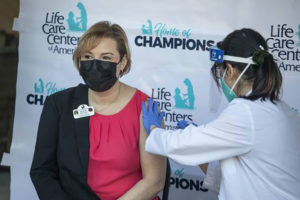Being aware of state staffing regulations and providing support to employees were crucial lessons for leaders at the Washington state nursing home that became the first U.S. site of a COVID-19 outbreak.

Care Center of Kirkland.
(Life Care Center of Kirkland photo)
“I look back on that timeframe and initially I didn’t think I was being a good leader. I was just making it through day by day,” said Ellie Schutt, executive director of the Life Care Center of Kirkland. “You can do more than you think you do and it’s OK to cry with your staff.”
Schutt shared her staff’s experiences during a panel presentation Tuesday on the opening day of the American College of Health Care Administrators 2021 Convocation & Expo.
During the first days of the outbreak in late February 2020, employees suffered through low supplies of personal protective equipment, lack of testing, critical workforce shortages and no federal support.
The first critical lesson facility leaders had to learn was that normal staffing ratios go out the window during a crisis.
“This was not your average flu outbreak or pneumonia outbreak within a facility. It was really important and remains important knowing the mitigation plan for staffing and what is allowed and what isn’t allowed,” Schutt said.
By March 4, the facility was dealing with its “most difficult” day, reported Schutt. The nursing home found itself without 40% of its staff, who were out sick. In addition, vendors refused to enter facilities and “a lot of patients turned for the worse.”
“It just really became a lot of doing what we could to take care of the patients that we had,” Schutt said.
Schutt said the next critical lesson in leadership was providing support for employees, as well as patients. This includes listening and remaining calm.
“Listen to what people are saying, not just the residents, but your staff members [too],” Schutt said. “It really, really became important to have those one-on-one meetings with the staff to answer staff questions.”
She later emphasized, “It’s OK to have those conversations. It’s OK to be scared with your staff. It’s okay to relate to your staff.”





